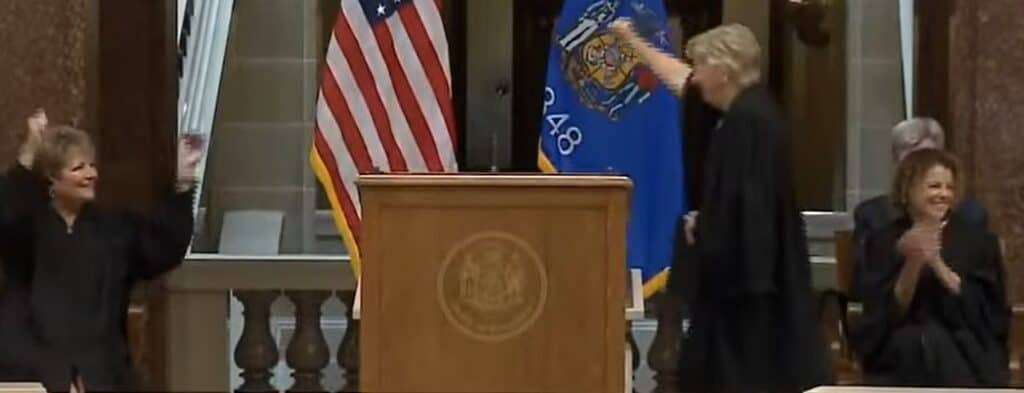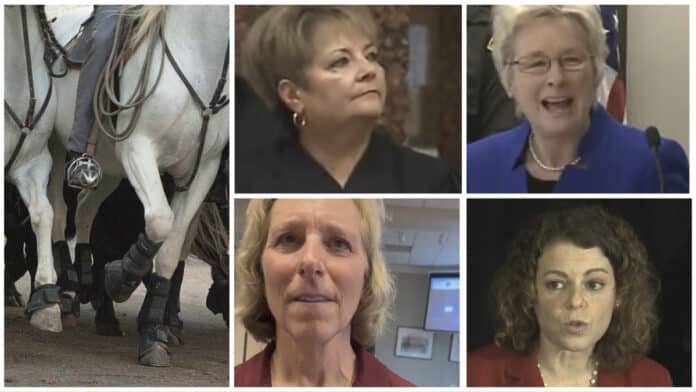The Wisconsin dropbox decision is yet another example of the liberal justices operating above the law, the dissent indicates.
In a fiery dissent, conservative Wisconsin Justice Rebecca Bradley accused the liberal partisans controlling the court’s majority of forsaking “the rule of law in an attempt to advance” a political agenda, by legalizing unmanned dropboxes in elections.
She wrote that the liberals’ decision would allow Wisconsin ballots to be turned in through unsecured sacks or an “unattended cardboard box.”
“An unattended cardboard box on the clerk’s driveway? An unsecured sack sitting outside the local library or on a college campus?” Rebecca Bradley wrote. “Door-to-door retrieval from voters’ homes or dorm rooms? Under the majority’s logic, because the statute doesn’t expressly forbid such methods of ballot delivery, they are perfectly lawful.”
“The members of the majority in this case make their will the law, according four lawyers on the state’s highest court the unchecked power to say what the law shall be, rather than what it is,” Rebecca Bradley wrote. “The majority in this case overrules Teigen (the previous case finding dropboxes were illegal just two years ago) not because it is legally erroneous, but because the majority finds it politically inconvenient.”
The liberal justices – Jill Karofsky, Janet Protasiewicz, Rebecca Dallet, and Ann Walsh-Bradley – ignored the plain letter of the law, specifically Wis. Stat. § 6.87(4)(b)1., the dissent, which was joined by Justices Brian Hagedorn and Annette Ziegler, says.
Wisconsin law reads,
“The envelope shall be mailed by the elector, or delivered in person, to the municipal clerk issuing the ballot or ballots.”
“We conclude that Wis. Stat. § 6.87(4)(b)1. allows the use of ballot drop boxes,” the liberal justices wrote.
“The majority began this term by tossing the legislative maps adopted by this court in Johnson v. Wisconsin Elections Commission, for the sole purpose of facilitating ‘the redistribution of political power in the Wisconsin legislature,'” Rebecca Bradley wrote. “The majority ends the term by loosening the legislature’s regulations governing the privilege of absentee voting in the hopes of tipping the scales in future elections.”

Before the state Democratic Party spent $10 million to help liberal Janet Protasiewicz win a seat on the court, the Wisconsin Supreme Court had interpreted the statutory language to mean state law bans dropboxes because they are neither a municipal clerk nor involve mailing a ballot. The court determined then that “[a]n inanimate object, such as a ballot drop box, cannot be the municipal clerk.”
Conservative legal expert Rick Esenberg, president of the Wisconsin Institute for Law and Liberty, maintained on Friday that the liberal justices are operating above the law.
“‘… delivered in person, to the municipal clerk issuing the ballot’ does not mean leaving it somewhere for the clerk to pick it up later, even if the clerk picks the spot. That’s just not a natural reading of that language no matter how much you wish it to be,” Esenberg wrote on X.
The liberal justices threw that logic out the window on Friday July 6, and they flouted the concept of stare decisis, which, according to the decision, “refers to the principle that requires courts to ‘stand by things decided.'”
Rebecca Bradley wrote that the liberal majority “replaces the only reasonable interpretation of the law with a highly implausible one, and tramples the doctrine of stare decisis.”
The liberals wrote that the question is “whether delivery to a drop box constitutes delivery ‘to the municipal clerk’ within the meaning of Wis. Stat. § 6.87(4)(b)1. We conclude that it does. A drop box is set up, maintained, secured, and emptied by the municipal clerk. This is the case even if the drop box is in a location other than the municipal clerk’s office.”
Liberal Justice Ann Walsh-Bradley wrote the majority opinion.
There is a state Supreme Court race next April to replace Walsh-Bradley, who is retiring. Former Republican Attorney General Brad Schimel, who is a Waukesha County judge, is running against leftist Dane County Judge Susan Crawford, who worked for Planned Parenthood.
Republican Wisconsin Congressman Tom Tiffany wrote, “Just after Wisconsinites voted overwhelmingly to bolster election integrity in the state, the liberal Wisconsin Supreme Court voted to overturn a previous precedent they set, effectively legalizing anonymous ballot box stuffing. This decision not only opens the door to potentially fraudulent activities but also undermines the expressed desires of Wisconsin voters.”
Continued Tiffany, “Wisconsin voters overwhelmingly called for election integrity in the spring election. The four liberal Supreme Court justices ignored them and said no. Any ballot box improprieties now rest at their feet.”
Conservative activist Scarlett Johnson wrote on X, “I want to see ballot Dropboxes in deep red areas of Wisconsin. I want to church picnics in the park with ballot drop boxes. I want to see gun shows with ballot drop boxes. I want to see ballot drop boxes at arenas heavily trafficked by likely Trump supporters. Fight fire with fire.”
Conservative commentator Aaron Rodriguez asked Esenberg, “How do you get around the permissive principle — the idea that if it’s not explicitly forbidden by law, it can be permitted so long as it serves the law’s purpose? It seems that it just opens the door for a ‘spirit of the law’ approach over the ‘letter of the law’ approach.”
Esenberg responded, “Doesn’t apply here. The statute says you must return an absentee ballot by methods A or B. If you must do A or B, you cannot due C, D, F or anything else that is not A or B.”
Esenberg wrote, “In our report on the 2020 election, we said that ‘[I]f the use of drop boxes continues moving forward, the legislature should explicitly authorize their usage and adopt uniform standards.’ We then set forth four requirements. Because the law doesn’t actually permit them, there are no rules governing their use.”
Ann Jacobs, the partisan Democrat on the Wisconsin Election Commission, wrote on X, “Why are drop boxes often superior to the mail for absentee ballot return? A thread on Wisconsin’s recent decision to allow clerks to return to their decades-long use of drop boxes for the return of absentee ballots.”
Her thread included the following: “First: Your ballot goes directly from you to your clerk! Ballots are retrieved by election workers (or the clerk themselves) and taken directly to the clerk’s office. From your hands to election officials’ hands!”
But Esenberg responded that dropboxes are not permitted by state law.
“None of this has anything to do with whether they are permitted by statute,” Esenberg responded on X. “All of these would be arguments for the legislature to make them legal. And, if that were done, the legislature could also include rules for their security, etc. We looked at how they were used in 2020 and local practices were all over the place.”





















![WATCH: Elon Musk Town Hall Rally in Green Bay [FULL Video]](https://www.wisconsinrightnow.com/wp-content/uploads/2022/04/Elon_Musk_3018710552-356x220.jpg)











